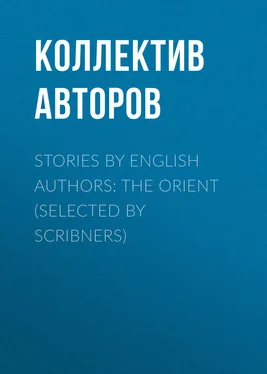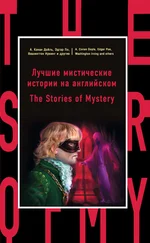Коллектив авторов - Stories by English Authors - The Orient (Selected by Scribners)
Здесь есть возможность читать онлайн «Коллектив авторов - Stories by English Authors - The Orient (Selected by Scribners)» — ознакомительный отрывок электронной книги совершенно бесплатно, а после прочтения отрывка купить полную версию. В некоторых случаях можно слушать аудио, скачать через торрент в формате fb2 и присутствует краткое содержание. Жанр: foreign_antique, foreign_prose, Детская проза, на английском языке. Описание произведения, (предисловие) а так же отзывы посетителей доступны на портале библиотеки ЛибКат.
- Название:Stories by English Authors: The Orient (Selected by Scribners)
- Автор:
- Жанр:
- Год:неизвестен
- ISBN:нет данных
- Рейтинг книги:3 / 5. Голосов: 1
-
Избранное:Добавить в избранное
- Отзывы:
-
Ваша оценка:
- 60
- 1
- 2
- 3
- 4
- 5
Stories by English Authors: The Orient (Selected by Scribners): краткое содержание, описание и аннотация
Предлагаем к чтению аннотацию, описание, краткое содержание или предисловие (зависит от того, что написал сам автор книги «Stories by English Authors: The Orient (Selected by Scribners)»). Если вы не нашли необходимую информацию о книге — напишите в комментариях, мы постараемся отыскать её.
Stories by English Authors: The Orient (Selected by Scribners) — читать онлайн ознакомительный отрывок
Ниже представлен текст книги, разбитый по страницам. Система сохранения места последней прочитанной страницы, позволяет с удобством читать онлайн бесплатно книгу «Stories by English Authors: The Orient (Selected by Scribners)», без необходимости каждый раз заново искать на чём Вы остановились. Поставьте закладку, и сможете в любой момент перейти на страницу, на которой закончили чтение.
Интервал:
Закладка:
“ The most amazing miracles was at Lodge next night. One of the old priests was watching us continuous, and I felt uneasy, for I knew we’d have to fudge the Ritual, and I didn’t know what the men knew. The old priest was a stranger come in from beyond the village of Bashkai. The minute Dravot puts on the Master’s apron that the girls had made for him, the priest fetches a whoop and a howl, and tries to overturn the stone that Dravot was sitting on. ‘It’s all up now,’ I says. ‘That comes of meddling with the Craft without warrant!’ Dravot never winked an eye, not when ten priests took and tilted over the Grand Master’s chair – which was to say, the stone of Imbra. The priest begins rubbing the bottom end of it to clear away the black dirt, and presently he shows all the other priests the Master’s Mark, same as was on Dravot’s apron, cut into the stone. Not even the priests of the temple of Imbra knew it was there. The old chap falls flat on his face at Dravot’s feet and kisses ‘em. ‘Luck again,’ says Dravot, across the Lodge, to me; ‘they say it’s the missing Mark that no one could understand the why of. We’re more than safe now.’ Then he bangs the butt of his gun for a gavel and says, ‘By virtue of the authority vested in me by my own right hand and the help of Peachey, I declare myself Grand Master of all Freemasonry in Kafiristan in this the Mother Lodge o’ the country, and King of Kafiristan equally with Peachey!’ At that he puts on his crown and I puts on mine, – I was doing Senior Warden, – and we opens the Lodge in most ample form. It was an amazing miracle! The priests moved in Lodge through the first two degrees almost without telling, as if the memory was coming back to them. After that Peachey and Dravot raised such as was worthy – high priests and Chiefs of far-off villages. Billy Fish was the first, and I can tell you we scared the soul out of him. It was not in any way according to Ritual, but it served our turn. We didn’t raise more than ten of the biggest men, because we didn’t want to make the Degree common. And they was clamouring to be raised.
“‘In another six months,’ says Dravot, ‘we’ll hold another Communication and see how you are working.’ Then he asks them about their villages, and learns that they was fighting one against the other, and were sick and tired of it. And when they wasn’t doing that they was fighting with the Mohammedans. ‘You can fight those when they come into our country,’ says Dravot. ‘Tell off every tenth man of your tribes for a Frontier guard, and send two hundred at a time to this valley to be drilled. Nobody is going to be shot or speared any more so long as he does well, and I know that you won’t cheat me, because you’re white people – sons of Alexander – and not like common black Mohammedans. You are my people, and, by God,’ says he, running off into English at the end, ‘I’ll make a damned fine Nation of you, or I’ll die in the making!’
“I can’t tell all we did for the next six months, because Dravot did a lot I couldn’t see the hang of, and he learned their lingo in a way I never could. My work was to help the people plough, and now and again go out with some of the Army and see what the other villages were doing, and make ‘em throw rope bridges across the ravines which cut up the country horrid. Dravot was very kind to me, but when he walked up and down in the pine wood pulling that bloody red beard of his with both fists I knew he was thinking plans I could not advise about, and I just waited for orders.
“But Dravot never showed me disrespect before the people. They were afraid of me and the Army, but they loved Dan. He was the best of friends with the priests and the Chiefs; but any one could come across the hills with a complaint, and Dravot would hear him out fair, and call four priests together and say what was to be done. He used to call in Billy Fish from Bashkai, and Pikky Kergan from Shu, and an old Chief we called Kafuzelum, – it was like enough to his real name, – and hold councils with ‘em when there was any fighting to be done in small villages. That was his Council of War, and the four priests of Bashkai, Shu, Khawak, and Madora was his Privy Council. Between the lot of ‘em they sent me, with forty men and twenty rifles, and sixty men carrying turquoises, into the Ghorband country to buy those hand-made Martini rifles, that come out of the Amir’s workshops at Kabul, from one of the Amir’s Herati regiments that would have sold the very teeth out of their mouths for turquoises.
“I stayed in Ghorband a month, and gave the Governor there the pick of my baskets for hush-money, and bribed the Colonel of the regiment some more, and, between the two and the tribes-people, we got more than a hundred hand-made Martinis, a hundred good Kohat Jezails that’ll throw to six hundred yards, and forty man-loads of very bad ammunition for the rifles. I came back with what I had, and distributed ‘em among the men that the Chiefs sent in to me to drill. Dravot was too busy to attend to those things, but the old Army that we first made helped me, and we turned out five hundred men that could drill, and two hundred that knew how to hold arms pretty straight. Even those cork-screwed, hand-made guns was a miracle to them. Dravot talked big about powder-shops and factories, walking up and down in the pine wood when the winter was coming on.
“‘I won’t make a Nation,’ says he. ‘I’ll make an Empire! These men aren’t niggers; they’re English! Look at their eyes – look at their mouths. Look at the way they stand up. They sit on chairs in their own houses. They’re the Lost Tribes, or something like it, and they’ve grown to be English. I’ll take a census in the spring if the priests don’t get frightened. There must be a fair two million of ‘em in these hills. The villages are full o’ little children. Two million people – two hundred and fifty thousand fighting men – and all English! They only want the rifles and a little drilling. Two hundred and fifty thousand men, ready to cut in on Russia’s right flank when she tries for India! Peachey, man,’ he says, chewing his beard in great hunks, ‘we shall be Emperors – Emperors of the Earth! Rajah Brooke will be a suckling to us. I’ll treat with the Viceroy on equal terms. I’ll ask him to send me twelve picked English – twelve that I know of – to help us govern a bit. There’s Mackray, Serjeant Pensioner at Segowli – many’s the good dinner he’s given me, and his wife a pair of trousers. There’s Donkin, the Warder of Tounghoo Jail; there’s hundreds that I could lay my hand on if I was in India. The Viceroy shall do it for me; I’ll send a man through in the spring for those men, and I’ll write for a dispensation from the Grand Lodge for what I’ve done as Grand Master. That – and all the Sniders that’ll be thrown out when the native troops in India take up the Martini. They’ll be worn smooth, but they’ll do for fighting in these hills. Twelve English, a hundred thousand Sniders run through the Amir’s country in driblets, – I’d be content with twenty thousand in one year, – and we’d be an Empire. When everything was shipshape I’d hand over the crown – this crown I’m wearing now – to Queen Victoria on my knees, and she’d say, “Rise up, Sir Daniel Dravot.” Oh, it’s big! It’s big, I tell you! But there’s so much to be done in every place – Bashkai, Khawak, Shu, and everywhere else.’
Конец ознакомительного фрагмента.
Текст предоставлен ООО «ЛитРес».
Прочитайте эту книгу целиком, купив полную легальную версию на ЛитРес.
Читать дальшеИнтервал:
Закладка:
Похожие книги на «Stories by English Authors: The Orient (Selected by Scribners)»
Представляем Вашему вниманию похожие книги на «Stories by English Authors: The Orient (Selected by Scribners)» списком для выбора. Мы отобрали схожую по названию и смыслу литературу в надежде предоставить читателям больше вариантов отыскать новые, интересные, ещё непрочитанные произведения.
Обсуждение, отзывы о книге «Stories by English Authors: The Orient (Selected by Scribners)» и просто собственные мнения читателей. Оставьте ваши комментарии, напишите, что Вы думаете о произведении, его смысле или главных героях. Укажите что конкретно понравилось, а что нет, и почему Вы так считаете.












